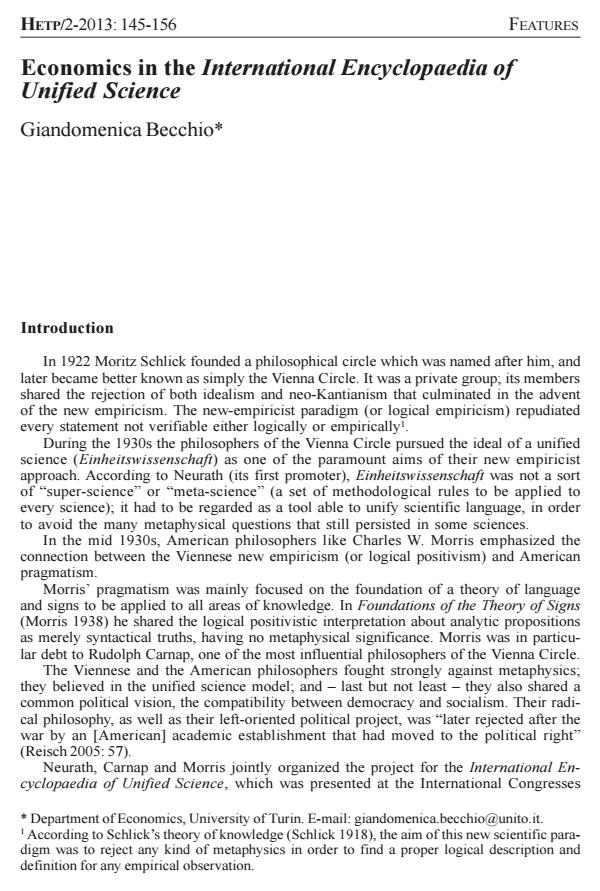Economics in the International Encyclopaedia of Unified Science
Titolo Rivista HISTORY OF ECONOMIC THOUGHT AND POLICY
Autori/Curatori Giandomenica Becchio
Anno di pubblicazione 2013 Fascicolo 2013/2 Lingua Inglese
Numero pagine 9 P. 145-153 Dimensione file 42 KB
DOI 10.3280/SPE2013-002007
Il DOI è il codice a barre della proprietà intellettuale: per saperne di più
clicca qui
Qui sotto puoi vedere in anteprima la prima pagina di questo articolo.
Se questo articolo ti interessa, lo puoi acquistare (e scaricare in formato pdf) seguendo le facili indicazioni per acquistare il download credit. Acquista Download Credits per scaricare questo Articolo in formato PDF

FrancoAngeli è membro della Publishers International Linking Association, Inc (PILA)associazione indipendente e non profit per facilitare (attraverso i servizi tecnologici implementati da CrossRef.org) l’accesso degli studiosi ai contenuti digitali nelle pubblicazioni professionali e scientifiche
The International Encyclopaedia of Unified Science, 1938-1969 (promoted, above all, by Otto Neurath in Vienna and Charles Morris in the United States) was based on the feasibility of building a "unified science" and it was carried on through the publication of a special "encyclopaedia" to show the meaning of this philosophical project. The purpose of this paper is to reconstruct, mainly from a historical point of view, the development of economic theory within this project: from the role of economics inside the Vienna Circle in the 1930s (more specifically in Neurath’s perspective) to the meaning of economics in Tintner’s volume, published in 1968. The role of economics inside the International Encyclopaedia is a part of the story of "the building of the economic "mainstream" (a quantitative and formalist approach to economic issues) during the 1950s and the 1960s in the USA.
Keywords:Unified science, economics, philosophy, Neurath, Tintner
Jel codes:A11, A12, B25, B40
- Craver E. (1986). The Emigration of the Austrian Economists, History of Political Economy, 18(1): 1-32.
- Dawson J.W. and K. Sigmund (2006). Gödel’s Vienna, The Mathematical Intelligencer, 28: 44-53.
- Feigl H. (1969). The Wiener Kreis in America. In Fleming and Baylin, (eds.)(1969): 57-93.
- Fleming D. and B. Baylin, (eds.)(1969). The Intellectual Migration, Cambridge (Mass), Harvard University Press.
- Frank P. (1948). The Institute for the Unity of Science, its Background and its Purpose. Synthese, 6 (3/4): 160-167.
- Gibrat R. (1936). La Science économique. Methodes et philosophie. In Actes du congress international de philosophie scientifique, Paris: Hermann &Cle Editeurs: 22-31.
- Hahn H., O. Neurath, and R. Carnap (1929). Wissenschaftliche Weltauffassung. Der Wiener Kreis. Wien: Arthur Wolf Verlag, In Neurath (ed.)(1973): 299-318.
- Janik A. and S. Toulmin (1996[1973]). Wittgenstein’s Vienna, Chicago, Ivan R. Dee, Publisher.
- Lange O. (1942). The Foundation of Welfare Economics. Econometrica, 10(3-4): 215-228.
- Leonard R. (1998). Ethics and the Excluded Middle. Karl Menger and the Social Science in Interwar Vienna. Isis, (89): 1-26.
- Menger K. (1994). Reminiscences of the Vienna Circle and the Mathematical Colloquium, Dordrecht, Kluwer Academic Publishers.
- Menger K. (2009). Unexplored Dimension: Karl Menger on Economics and Philosophy (1923-1938), Bingley (UK), Emerald Group Publishing.
- Menger Karl Papers, Perkins Library, Duke University: Durham, N. C.
- Morris C. (1938). Foundations of the Theory of Signs, Chicago, University of Chicago Press.
- Morris C. (1946). The Significance of Unity of Science Movement. International Phenomenological Society, 6(4): 508-515.
- Morris C. (1960). On the History of the International Encyclopaedia of Unified Science. Synthese, 12 (4): 517-521.
- Morris Charles, Correspondence, Regenstein Library, University of Chicago.
- Nemeth E. and F. Stadler (1996)(eds.) Encyclopedia and Utopia: The Life and Work of Otto Neurath (1882-1945), Wien: Kluwer Academic Publisher.
- Neurath O. (1969[1944]). Foundations of the Social Sciences, Chicago, University of Chicago Press.
- Neurath O. (ed.)(1973). Empiricism and Sociology, Dordrecht, Reidel.
- Neurath O. (2004). Economic Writings. Selection 1904-1945. Dordrecht, Kluwer Academic Publishers.
- Reisch G. (2005). How the Cold War Transformed Philosophy of Science. To the Icy Slope of Logic, Cambridge, Cambridge University Press.
- Richardson A. and T. Uebel (2007). The Cambridge Companion to Logical Empiricism, Cambridge, Cambridge University Press.
- Rutherford M. (2004). Institutional Economics at Columbia University. History of Political Economy, 36(1): 31-75.
- Schlick M. (1918). Allgemeine Erkenntnislehre, Berlin, Springer.
- Soulez A. (1996). Otto Neurath or the Will to Plan. In Nemeth and Stadler (1996)(eds.): 221-232.
- Stadler F. (2001). The Vienna Circle. Studies in the Origins, Development, and Influence of Logical Empiricism, Vienna-New York, Springer.
- Timms E. and J. Hughes (eds.)(2003). Intellectual Migration and Cultural Transformation. Refugees from National Socialism in the English-Speaking World, Vienna-New York, Springer.
- Tintner G. (1968). Methodology of Mathematical Economics and Econometrics. In The International Encyclopaedia of Unified Science, 2 (6), Chicago, University of Chicago Press.
- Vaughn K. (1994). Austrian Economics in America: The Migration of a Tradition, Cambridge, Cambridge University Press.
- OTTO NEURATH AND THE LINGUISTIC TURN IN ECONOMICS Michael Turk, in Journal of the History of Economic Thought /2016 pp.371
DOI: 10.1017/S1053837216000377
Giandomenica Becchio, Economics in the International Encyclopaedia of Unified Science in "HISTORY OF ECONOMIC THOUGHT AND POLICY" 2/2013, pp 145-153, DOI: 10.3280/SPE2013-002007